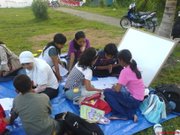| "Authorities, communities, and teachers now work together to improve education. Together we identify out-of-school children and help them to find ways to go back to school. The support has really helped my commune and we are proud of the positive changes we made." - Houl Seourn, chief of the Commune Council of Boeung Char |
 World Education and its partners serve over 60,000 children in 165 schools in 3 provinces. Scholarships have been provided to over 6,000 primary and secondary school students. |
In the remote regions of Cambodia, some of the country's poorest communities have limited access to schools, teachers, or educational support. Although the right to a basic education for every child is guaranteed in the Cambodian constitution, children in remote areas have not had access to government services. There are only a few complete school buildings in these areas, and it is difficult to recruit teachers to villages with poor living and working conditions. Few families can afford to purchase educational supplies and uniforms and parents often prefer to keep children, especially girls, at home to contribute to household income. These issues particularly hurt children who are left at the margins of Cambodian society—those who are from ethnic minority groups, impoverished, affected by HIV and AIDS, or disabled.
The children of Chour Krang, a village in the northeast province of Kratie, were affected by many of these issues. Before World Education began implementing the Education Support to Children in Under-served Populations (ESCUP) Project with its local partners, children from the Steang minority group had to walk almost three miles a day through dense bush and forest to reach their school. The youngest were often kept at home because of the distance, delaying their education.
The children of Beoung Char, an island located in the Mekong River along the border of Kratie Province, faced a similar problem. Families were spread out over the 12-mile island, which lacked proper roads and infrastructure. According to Houl Seourn, chief of the Commune Council of Boeung Char, "many of the children lived too far away from the three schools on the island, and villagers were concerned about the limited education opportunities for their children."
Through ESCUP, part of the EQUIP1 partnership led by American Institutes for Research, World Education and its partners work with underserved communities to improve access to education. In Kratie Province, World Education and its partners consulted with school committees, village leaders, and parents in communities like Chour Krang and Beoung Char, to identify the different obstacles to education. With ESCUP support, community members worked together to devise solutions and take action. In Chour Krang, community members chose to build a temporary school building closer to the village. ESCUP provided the funds for materials, while community members provided labor.
 Children from Chour Krang stand outside their new school building during construction. |
By working together, the community is now more involved and engaged in keeping children in school. Today, more than 113 children are now attending the school and children are able to enroll at age six, instead of waiting until they can manage the long walk to school. Non Phorn, the deputy village chief of Chour Krang, noted that even though there are limited resources in the village, he is "glad that the local people made contributing labor to the new village school a priority because education is a precious thing for all the children in the village."
In Beoung Char, the community came together to construct several small schools in areas far from the government schools. However, the community could not afford to hire teachers and it was difficult to recruit trained teachers to work in their remote area. After consultation, ESCUP worked with the community to identify local community members and train them as teachers. Houl Seourn describes the benefits of training local teachers: "this has improved the education services tremendously, especially because the teachers come from our own community and understand the children and their situations well. The support from ESCUP facilitated better collaboration between the communities, schools, and the Ministry of Education, Youth and Sports (MoEYS), and strengthened the role of the community in education."


Tidak ada komentar:
Posting Komentar